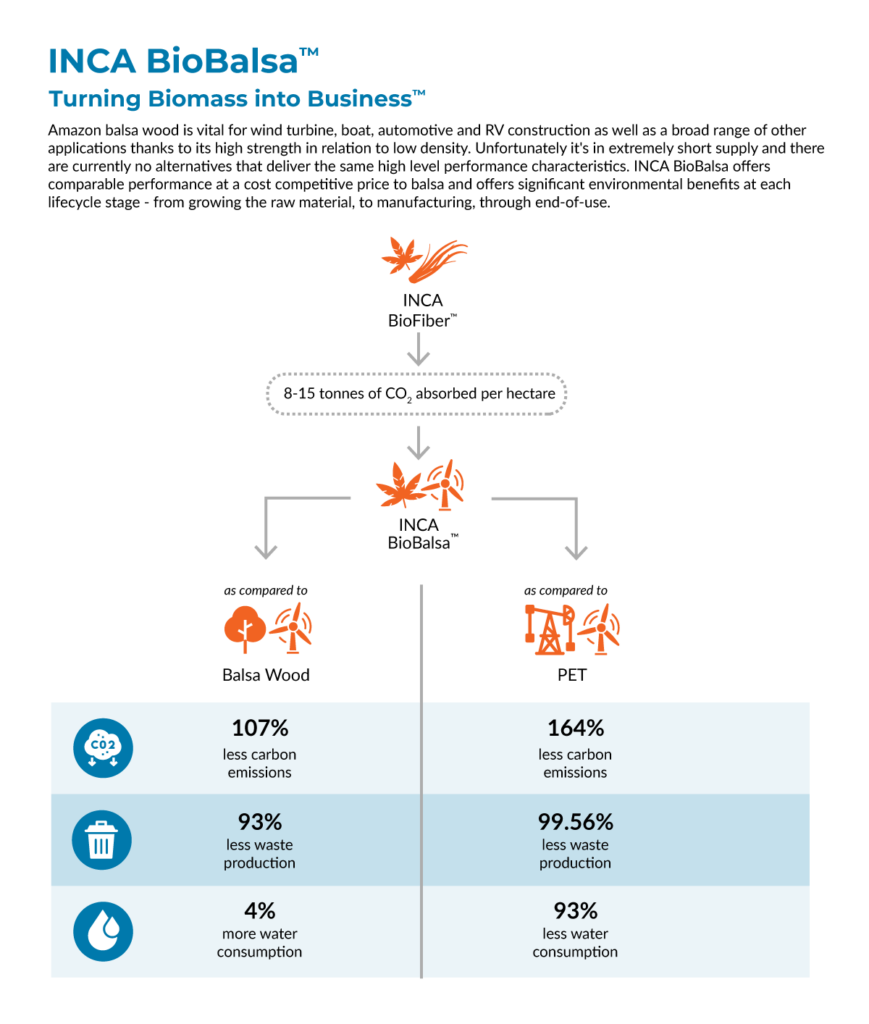Hemp is the second-fastest growing plant on earth. With over 40% of Canada’s hemp production happening in Alberta, it’s a well-known crop to prairie farmers.
Lately, hemp has been turning heads for other reasons. It has the ability to revolutionize clean energy, address deforestation in Central America, cut emissions and reduce waste in the automobile industry. It can even make your camping trips eco-friendlier.
INCA Renewtech is a company leading hemp’s exciting new look. On April 21, 2022, the company announced it was building a one-of-a-kind, 200,000-square-foot hemp fibre processing and composites manufacturing facility in Vegreville, Alberta.
Working with partners and local farmers, they will take hemp biomass left over from protein production and turn it into high-value dimensioned fibre and cellulose, creating hemp-based composite panel products such as INCA BioPanels, BioPlastics, BioBalsa and PrePregs.
INCA’s BioBalsa will be manufactured at the Vegreville facility as a direct substitute for balsa wood which is used in the construction of boats and wind turbine blades. Balsa wood was originally harvested in Equador, which has led to deforestation there and also in Peru. About 60% is now plantation grown in order to try to meet the demand particularly from the wind industry.
Balsa is fast-growing but doesn’t grow quickly enough on balsa plantations to extract whole logs large enough to cut long boards. Manufacturers have resorted to gluing together cross-cut squares from trunks of trees to form stress skin panels. This development has added considerable cost to manufacturing balsa dimensional sheets and cross cut balsa planks lack the strength of old growth balsa.
Because there is less balsa wood, some companies are turning to thermoplastics as a substitute but they are also more expensive, much more carbon intensive and can’t deliver the same performance as balsa.
INCA aims to change that with BioBalsa — unlike balsa it is moisture and fire-resistant, and offers better strength. Versus balsa, PET or PVC, INCA BioBalsa is sustainable at every stage of its lifecycle. While growing, hemp sequesters 8-15 tonnes of CO2e per acre and during the manufacturing process BioBalsa delivers 164% less carbon impact than thermoplastics and 107% less than balsa.

Cleantech and agri-tech investments in Alberta
The long fibre from INCA’s Vegreville facility will be sent via rail to INCA’s second factory in Bristol, Indiana to manufacture BioPanels for the RV industry and BioPlastics for the consumer products industry and PrePregs for the automotive industry. INCA’s clients include Winnebago and Toyota.
INCA’s customers are interested in the performance characteristics of the company’s hemp based biocomposites and also in the ESG features. Not only do the bio-composites sequester carbon, they can be remanufactured back into new products at the end of their useful lifecycle. In addition, INCA’s factories will be energy efficient and generate zero waste, air or water pollution and all of the companies employees will be shareholders.
Invest Alberta is supporting INCA’s investment journey in Alberta by connecting the company to potential investors, strategic partners, grant sources and researchers, as well as providing export guidance.
INCA’s choice to locate in Alberta shines a spotlight on the province’s growing cleantech and agri-tech sectors, joining the growing list of green energy-related announcements in Alberta from PACE, Cvictus, Air Products and more. Investments to build a robust Alberta circular economy are being realized.
For regular communication on Alberta’s success stories and new announcements, subscribe to receive our updates:
Return to Index